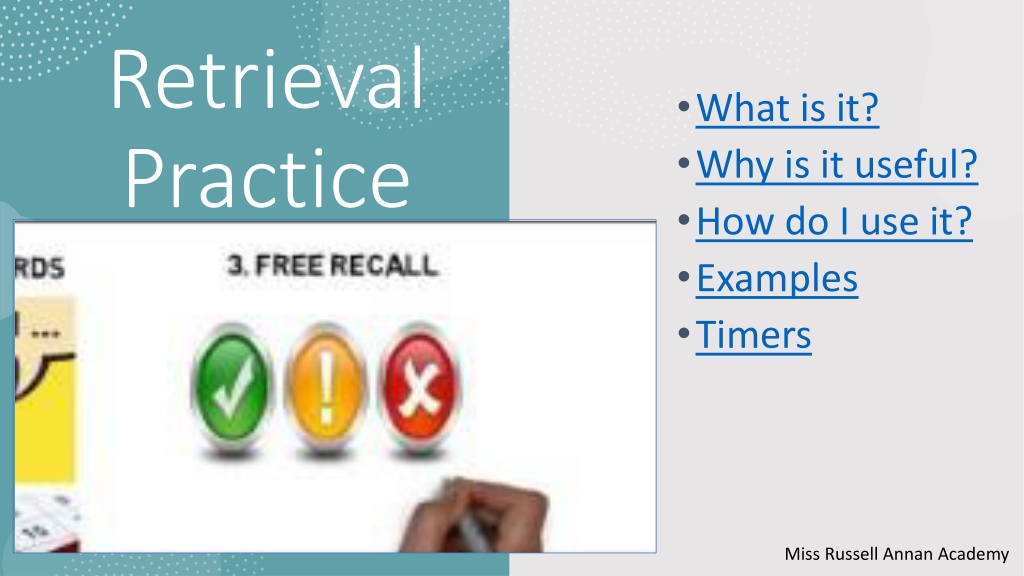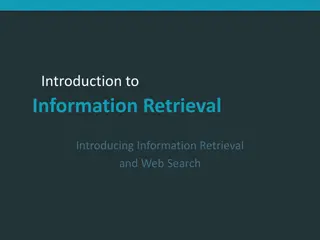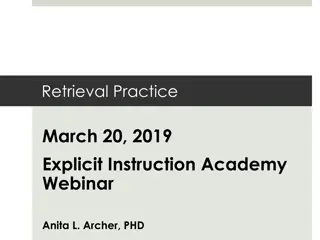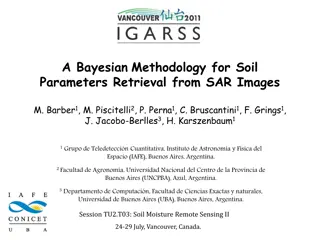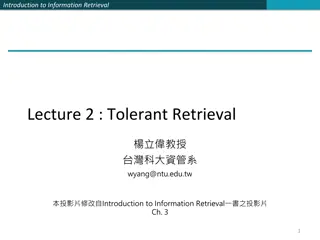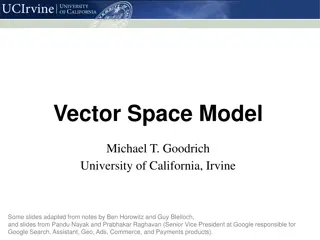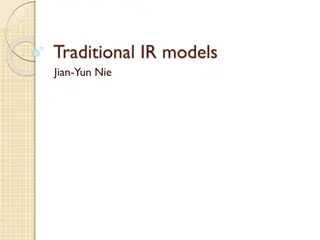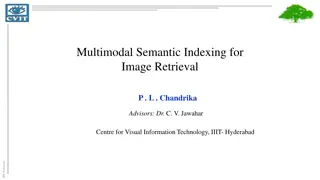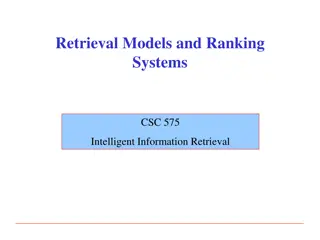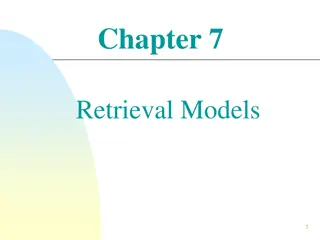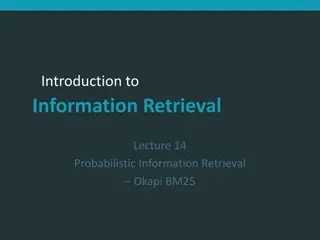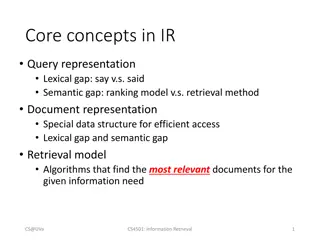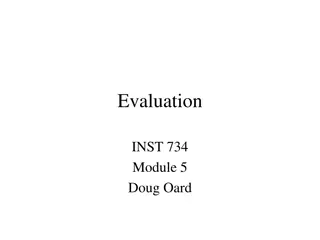Understanding Retrieval Practice in Learning
Retrieval practice is a powerful learning strategy that involves recalling previously learned material to strengthen memory, improve long-term retention, and identify gaps in knowledge. It helps in combating forgetting, enhancing understanding, reducing test anxiety, and promoting independent study skills. Regular application of retrieval practice, without access to textbooks or notes, along with timely feedback and mix of tasks, can significantly benefit learners.
Download Presentation

Please find below an Image/Link to download the presentation.
The content on the website is provided AS IS for your information and personal use only. It may not be sold, licensed, or shared on other websites without obtaining consent from the author. Download presentation by click this link. If you encounter any issues during the download, it is possible that the publisher has removed the file from their server.
E N D
Presentation Transcript
Retrieval Practice What is it? Why is it useful? How do I use it? Examples Timers Miss Russell Annan Academy
What is retrieval practice? Return to title slide Retrieval practice is any strategy that involves retrieving material that has been previously learned. It is a learning strategy, not an assessment tool which means it is used to cement learning, strengthen memory and improve long-term retention, not to assess learning. Retrieval practice can be used by teachers in lessons or can be used by learners themselves or with study partners
Why is retrieval practice useful? Return to title slide 1. Retrieval practice strengthens memory, therefore forgetting is less likely to occur in the long-term. Retrieval practice identifies gaps in learning as it forces an examination of what has been learned and where to focus more learning. Retrieval practice prevents overconfidence of learning, improves metacognition* and can be used to guide independent study. Retrieval practice improves understanding of material. Retrieval practice reduces test/assessment anxiety as learners feel more confident in their knowledge and also because it reduces the need for cramming . 2. 3. 4. 5. * Awareness and understanding of one s own thought processes.
How do I use retrieval practice? Return to title slide 1. Retrieval practice should be completed without access to textbooks or notes. Retrieval practice should be used regularly over the year/course. Each topic should be retrieved multiple times. Retrieval practice should be low stakes results should not be monitored/recorded this reduces the pressure to perform Feedback has to be given to improve memory of the correct answers. Learners should self-mark their own retrieval practice as this ensures that they are aware of what they do know and do not know, so they can then work on filling in the gaps. Teachers must teach the use of retrieval practice, including an explanation of why it is effective to learners so that they are able to use it in independent study. Use a mix of tasks. This prevents boredom and strengthens memory. 2. 3. 4. 5. 6. 7.
EXAMPLES Return to title slide Power Tickets Fix the errors grid Key word retrieval Brain dump Retrieval grid List it Retrieval clocks Summary sheets Throwback Thursday/Flashback Friday Five a day sheets Give me five Because, but, so Mind maps On the other hand... Essay retrieval Improve the answer Odd one out Cops and Robbers
Power tickets Return to EXAMPLES Write down three facts that you have learnt last lesson, last week, last month and last term. Last lesson: Last week: Last month: Last term:
Fix the Errors grids Return to EXAMPLES Create a grid and include correct and incorrect statements. Correct the incorrect statements in the grid. Topic: __________________________________
Return to EXAMPLES Key word retrieval Select a list of key words (use your Cornell notes key words margins to help) and write down definitions for the key words without using your notes/books. Key word/phrase Definition Retrieval practice Meta-cognition Cornell notes Long-term memory Short-term memory Self-regulated learner
Return to EXAMPLES Brain dump Simply write down as much as you can remember about a topic. Once completed check your notes or your course outline details to see what areas you remembered and what areas you forgot. Focus on the parts you forgot for future study.
Return to EXAMPLES Retrieval grid Answer as many questions as you can about the topic from memory. The questions can be colour coded in terms of difficulty/how recently they were first studied. Question Answer
Return to EXAMPLES List it List as many points as you can under key headings These headings could be factors in an essay, or categories, or dates in a time-line etc Factor 1: - - - - - - - - - Factor 2: Factor 3: Factor 4: Factor 5: Factor 6:
Return to EXAMPLES Retrieval clocks Add headings to each segment of a clock face. Spend 5 minutes retrieving your knowledge on each topic.
Return to EXAMPLES Summary sheets Divide a whole page or sheet of A4 into sections 4, 6, 8 etc. Identify the main aspects of a topic and use as headings in each box. Retrieve your knowledge on each aspect in the relevant box.
Throwback Thursday or Flashback Friday Return to EXAMPLES At the end of a lesson or week of lessons create a series of ten questions based on the lesson content. You should include the answers too. Go back to these questions a week later, or longer and test yourself. Best way to do it: write questions on the left side of an A4 sheet with answers on the right. Then fold the paper in two to have one side for the question and one side for the answers, Then you can assess yourself.
Return to EXAMPLES Five a day sheets Think of five questions for a neighbour to answer. This could include a range of question types/tasks including questions, keywords to define, words to use in a paragraph to summarise a topic, images to describe, events to put into chronological order, etc. Question Answer
Return to EXAMPLES Give me five Identify aspects of a topic and give five possible answers to each of them. 1 2 3 4 5
Return to EXAMPLES Because, but, so Provide three sentence starters one ending in because , one ending in but and one ending in so . Then complete the sentences. Retrieval practice is useful because Retrieval practice should be used by teachers but Retrieval practice is best completed spaced out on a regular basis so
Return to EXAMPLES Mind maps Provide the outline of a mind map for a topic for yourself or someone else to complete.
Return to EXAMPLES On the other hand... Present a topic area/argument and explain both sides of the argument or present it to someone else to complete. Topic Area / Argument
Return to EXAMPLES Essay retrieval - Context 1 - Context 2 - Line of argument - Factors Introduction Look up essay questions in past papers. Write down the key elements and factors (with details) to include in an essay. SQA Past Papers online service - Knowledge 1 - Knowledge 2 - Analysis - Analysis + - Evaluation - Knowledge 1 - Knowledge 2 - Analysis - Analysis + - Evaluation - Knowledge 1 - Knowledge 2 - Analysis - Analysis + - Evaluation Factor 1 = Factor 2 = Factor 3 = -Knowledge 1 - Knowledge 2 - Analysis - Analysis + - Evaluation Factor 4 = Summary of arguments Relative judgement Supporting reasons Conclusion
Return to EXAMPLES Improve the answer Answer a question from a past paper then give it someone else to improve on. This helps you to create a response to a question whilst knowing the wrong steps to do and helps others identify the wrong steps in a response to be able to correct them. Knowing the mistakes to make allows you to become better at understanding the correct steps. Corrections Feedback Answer 1 SQA Past Papers online service
Return to EXAMPLES Odd one out Each row contains something that is the odd one out. Pupils identify the odd one out and explain why it is odd. Category Category Category
Return to EXAMPLES Cops and Robbers The cops column is for you to write as much as you can from memory about a specific topic in a set amount of time. Once the first column is completed swap with other learners to see if you can get more information to put in the second column. It is not a competition, it s a focus on recall and working with others. Your own knowledge and recall Information you have stolen from your peers
Timers Timers click on the timers in presentation mode to activate them Return to EXAMPLES End 1 2 3 4 5 6 7 8 9 10 11 12 13 14 15 16 17 18 19 20 21 22 23 24 25 26 27 28 29 30 31 32 33 34 35 36 37 38 39 40 41 42 43 44 45 46 47 48 49 50 51 52 53 54 55 56 57 58 59 60 End 1 2 3 4 5 6 7 8 9 10 11 12 13 14 15 16 17 18 19 20 21 22 23 24 25 26 27 28 29 30 31 32 33 34 35 36 37 38 39 40 41 42 43 44 45 End 1 2 3 4 5 6 7 8 9 10 11 12 13 14 15 16 17 18 19 20 21 22 23 24 25 26 27 28 29 30 Button timers in seconds End 1 2 3 4 5 6 7 8 9 10 11 12 13 14 15 16 17 18 19 20 End 1 2 3 4 5 6 7 8 9 10 11 12 13 14 15 End 1 2 3 4 5 6 7 8 9 10
1 minute 2 minutes 3 minutes 5 minutes 4 minutes Return to EXAMPLES 10 minutes 15 minutes 20 minutes
2:00 1:59 1:58 1:57 1:56 1:55 1:54 1:53 1:52 1:51 1:50 1:49 1:48 1:47 1:46 1:45 1:44 1:43 1:42 1:41 1:40 1:39 1:38 1:37 1:36 1:35 1:34 1:33 1:32 1:31 1:30 1:29 1:28 1:27 1:26 1:25 1:24 1:23 1:22 1:21 1:20 1:19 1:18 1:17 1:16 1:15 1:14 1:13 1:12 1:11 1:10 1:09 1:08 1:07 1:06 1:05 1:04 1:03 1:02 1:01 1:00 0:59 0:58 0:57 0:56 0:55 0:54 0:53 0:52 0:51 0:50 0:49 0:48 0:47 0:46 0:45 0:44 0:43 0:42 0:41 0:40 0:39 0:38 0:37 0:36 0:35 0:34 0:33 0:32 0:31 0:30 0:29 0:28 0:27 0:26 0:25 0:24 0:23 0:22 0:21 0:20 0:19 0:18 0:17 0:16 0:15 0:14 0:13 0:12 0:11 0:10 0:09 0:08 0:07 0:06 0:05 0:04 0:03 0:02 0:01 End 2:00 1:30 1:29 1:28 1:27 1:26 1:25 1:24 1:23 1:22 1:21 1:20 1:19 1:18 1:17 1:16 1:15 1:14 1:13 1:12 1:11 1:10 1:09 1:08 1:07 1:06 1:05 1:04 1:03 1:02 1:01 1:00 0:59 0:58 0:57 0:56 0:55 0:54 0:53 0:52 0:51 0:50 0:49 0:48 0:47 0:46 0:45 0:44 0:43 0:42 0:41 0:40 0:39 0:38 0:37 0:36 0:35 0:34 0:33 0:32 0:31 0:30 0:29 0:28 0:27 0:26 0:25 0:24 0:23 0:22 0:21 0:20 0:19 0:18 0:17 0:16 0:15 0:14 0:13 0:12 0:11 0:10 0:09 0:08 0:07 0:06 0:05 0:04 0:03 0:02 0:01 End 1:30 1:00 0:59 0:58 0:57 0:56 0:55 0:54 0:53 0:52 0:51 0:50 0:49 0:48 0:47 0:46 0:45 0:44 0:43 0:42 0:41 0:40 0:39 0:38 0:37 0:36 0:35 0:34 0:33 0:32 0:31 0:30 0:29 0:28 0:27 0:26 0:25 0:24 0:23 0:22 0:21 0:20 0:19 0:18 0:17 0:16 0:15 0:14 0:13 0:12 0:11 0:10 0:09 0:08 0:07 0:06 0:05 0:04 0:03 0:02 0:01 End 1:00 Return to EXAMPLES
